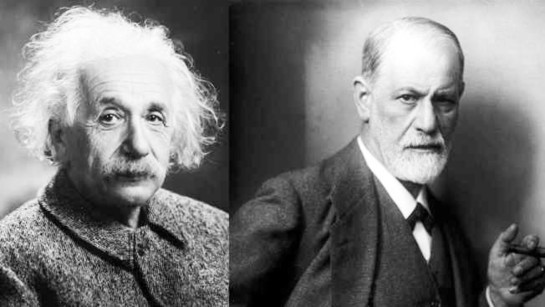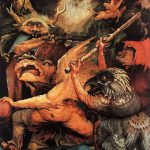The text below is a slightly abridged version of a letter written by Albert Einstein to Sigmund Freud. Under the title Why War?, the letter and Freud’s reply to it were published in 1933 by the International Institute of Intellectual Cooperation. They formed part of an international series of open letters, sponsored by the Institute, in which leading intellectuals exchanged ideas on major questions, the most crucial of which was the threat of war.

Caputh near Potsdam, 30 July, 1932
Dear Professor Freud,…
Is there any way of delivering mankind from the menace of war?
It is common knowledge that, with the advance of modern science, this issue has come to mean a matter of life and death for civilization as we know it; nevertheless, for all the zeal displayed, every attempt at its solution has ended in a lamentable breakdown.
I believe, moreover, that those whose duty it is to tackle the problem professionally and practically are growing only too aware of their impotence to deal with it, and have now a very lively desire to learn the views of men who, absorbed in the pursuit of science, can see world-problems in the perspective distance lends. As for me, the normal objective of my thought affords no insight into the dark places of human will and feeling. Thus, in the enquiry now proposed, I can do little more than seek to clarify the question at issue and, clearing the ground of the more obvious solutions, enable you to bring the light of your far-reaching knowledge of man’s instinctive life to bear upon the problem…
…As one immune from nationalist bias, I personally see a simple way of dealing with the superficial (i.e. administrative) aspect of the problem: the setting up, by international consent, of a legislative and judicial body to settle every conflict arising between nations. Each nation would undertake to abide by the orders issued by this legislative body, to invoke its decision in every dispute, to accept its judgments unreservedly and to carry out every measure the tribunal deems necessary for the execution of its decrees. But here, at the outset, I come up against a difficulty; a tribunal is a human institution which, in proportion as the power at its disposal is inadequate to enforce its verdicts, is all the more prone to suffer these to be deflected by extrajudicial pressure. This is a fact with which we have to reckon; law and might inevitably go hand in hand, and juridical decisions approach more nearly the ideal justice demanded by the community (in whose name and interests these verdicts are pronounced) in so far as the community has effective power to compel respect of its juridical ideal. But at present we are far from possessing any supranational organization competent to render verdicts of incontestable authority and enforce absolute submission to the execution of its verdicts. Thus I am led to my first axiom: the quest of international security involves the unconditional surrender by every nation, in a certain measure, of its liberty of action, its sovereignty that is to say, and it is clear beyond all doubt that no other road can lead to such security.
The ill-success, despite their obvious sincerity, of all the efforts made during the last decade to reach this goal leaves us no room to doubt that strong psychological factors are at work, which paralyse these efforts. Some of these factors are not far to seek. The craving for power which characterizes the governing class in every nation is hostile to any limitation of the national sovereignty. This political power-hunger is wont to batten on the activities of another group, whose aspirations are on purely mercenary, economic lines. I have specially in mind that small but determined group, active in every nation, composed of individuals who, indifferent to social considerations and restraints, regard warfare, the manufacture and sale of arms, simply as an occasion to advance their personal interests and enlarge their personal authority.
But recognition of this obvious fact is merely the first step towards an appreciation of the actual state of affairs. Another question follows hard upon it: how is it possible for this small clique to bend the will of the majority, who stand to lose and suffer by a state of war, to the service of their ambitions? (In speaking of the majority, I do not exclude soldiers of every rank who have chosen war as their profession, in the belief that they are serving to defend the highest interests of their race, and that attack is often the best method of defence.) An obvious answer to this question would seem to be that the minority, the ruling class at present, has the schools and press, usually the Church as well, under its thumb. This enables it to organize and sway the emotions of the masses, and make its tool of them.
Yet even this answer does not provide a complete solution. Another question arises from it: How is it these devices succeed so well in rousing men to such wild enthusiasm, even to sacrifice their lives? Only one answer is possible. Because man has within him a lust for hatred and destruction. In normal times this passion exists in a latent state, it emerges only in unusual circumstances; but it is a comparatively easy task to call it into play and raise it to the power of a collective psychosis. Here lies, perhaps, the crux of all the complex of factors we are considering, an enigma that only the expert in the lore of human instincts can resolve.
And so we come to our last question. Is it possible to control man’s mental evolution so as to make him proof against the psychoses of hate and destructiveness? Here I am thinking by no means only of the so-called uncultured masses. Experience proves that it is rather the so-called “Intelligentzia” that is most apt to yield to these disastrous collective suggestions, since the intellectual has no direct contact with life in the raw, but encounters it in its easiest, synthetic form upon the printed page.
To conclude: I have so far been speaking only of wars between nations; what are known as international conflicts. But I am well aware that the aggressive instinct operates under other forms and in other circumstances. (I am thinking of civil wars, for instance, due in earlier days to religious zeal, but nowadays to social factors; or, again, the persecution of racial minorities). But my insistence on what is the most typical, most cruel and extravagant form of conflict between man and man was deliberate, for here we have the best occasion of discovering ways and means to render all armed conflicts impossible.
Yours very sincerely,
A. Einstein
The father of psychoanalysis, whom Einstein described as an “expert in the lore of human instincts”, replied two months later, spelling out his thoughts on the psychical foundations of behaviour and defining possible ways in which the conflicts rending humanity could be brought to a halt.

Dear Professor Einstein,…
You begin with the relations between Might and Right, and this is assuredly the proper starting-point for our enquiry. But, for the term “might”, I would substitute a tougher and more telling word: “violence”. In right and violence we have today an obvious antinomy. It is easy to prove that one has evolved from the other…
Conflicts of interest between man and man are resolved, in principle, by recourse to violence. It is the same in the animal kingdom, from which man cannot claim exclusion; nevertheless men are also prone to conflicts of opinion, touching, on occasion, the loftiest peaks of abstract thought, which seem to call for settlement by quite another method. This refinement is, however, a late development.
To start with, brute force was the factor which, in small communities, decided points of ownership and the question of which man’s will was to prevail. Very soon physical force was implemented, then replaced, by the use of various adjuncts; he proved the victor whose weapon was the better, or handled the more skilfully.
Now, for the first time, with the coming of weapons, superior brains began to oust brute force, but the object of the conflict remained the same: one party was to be constrained, by the injury done him or impairment of his strength, to retract a claim or a refusal. This end is most effectively gained when the opponent is definitively put out of action in other words, is killed.
This procedure has two advantages; the enemy cannot renew hostilities, and, secondly, his fate deters others from following his example. Moreover, the slaughter of a foe gratifies an instinctive craving a point to which we shall revert hereafter. However, another consideration may be set off against this will to kill: the possibility of using an enemy for servile tasks if his spirit be broken and his life spared. Here violence finds an outlet not in slaughter but in subjugation. Hence springs the practice of giving quarter; but the victor, having from now on to reckon with the craving for revenge that rankles in his victim, forfeits to some extent his personal security.
From violence to law
[…] We know that in the course of evolution this state of things was modified, a path was traced that led away from violence to law. But what was this path? Surely it issued from a single verity; that the superiority of one strong man can be overborne by an alliance of many weaklings, that l’union fait la force. Brute force is overcome by union, the allied might of scattered units makes good its right against the isolated giant.
Thus we may define “right” (i.e. law) as the might of a community. Yet it, too, is nothing else than violence, quick to attack whatever individual stands in its path, and it employs the selfsame methods, follows like ends, with but one difference; it is the communal, not individual, violence that has its way.
But, for the transition from crude violence to the reign of law, a certain psychological condition must first obtain. The union of the majority must be stable and enduring. If its sole raison d’être be the discomfiture of some overweening individual and, after his downfall, it be dissolved, it leads to nothing. Some other man, trusting to his superior power, will seek to reinstate the rule of violence and the cycle will repeat itself unendingly.
Thus the union of the people must be permanent and well-organized; it must enact rules to meet the risk of possible revolts; must set up machinery ensuring that its rules the laws are observed and that such acts of violence as the laws demand are duly carried out. This recognition of a community of interests engenders among the members of the group a sentiment of unity and fraternal solidarity which constitutes its real strength.
[…] Now the position is simple enough so long as the community consists of a number of equipollent individuals. The laws of such a group can determine to what extent the individual must forfeit his personal freedom, the right of using personal force as an instrument of violence, to ensure the safety of the group.
But such a combination is only theoretically possible; in practice the situation is always complicated by the fact that, from the outset, the group includes elements of unequal power, men and women, elders and children, and, very soon, as a result of war and conquest, victors and the vanquished i.e. masters and slaves as well. From this time on the common law takes notice of these inequalities of power, laws are made by and for the rulers, giving the servile classes fewer rights.
Thenceforward there exist within the state two factors making for legal instability, but legislative evolution, too: first, the attempts by members of the ruling class to set themselves above the law’s restrictions and, secondly, the constant struggle of the ruled to extend their rights and see each gain embodied in the code, replacing legal disabilities by equal laws for all.
The second of these tendencies will be particularly marked when there takes place a positive mutation of the balance of power within the community, the frequent outcome of certain historical conditions. In such cases the laws may gradually be adjusted to the changed conditions or (as more usually ensues) the ruling class is loath to reckon with the new developments, the result being insurrections and civil wars, a period when law is in abeyance and force once more the arbiter, followed by a new regime of law. There is another factor of constitutional change, which operates in a wholly pacific manner, viz: the cultural evolution of the mass of the community; this factor, however, is of a different order and can only be dealt with later.
A supreme authority
Thus we see that, even within the group itself, the exercise of violence cannot be avoided when conflicting interests are at stake. But the common needs and habits of men who live in fellowship under the same sky favour a speedy issue of such conflicts and, this being so, the possibilities of peaceful solutions make steady progress. Yet the most casual glance at world history will show an unending series of conflicts between one community and another or a group of others, between large and smaller units, between cities, countries, races, tribes and kingdoms, almost all of which were settled by the ordeal of war. Such wars end either in pillage or in conquest and its fruits, the downfall of the loser.
No single all-embracing judgement can be passed on these wars of aggrandisement. Some, like the war between the Mongols and the Turks, have led to unmitigated misery; others, however, have furthered the transition from violence to law, since they brought larger units into being, within whose limits a recourse to violence was banned and a new regime determined all disputes. Thus the Roman conquests brought that boon, the pax Romana, to the Mediterranean lands. The French kings’ lust for aggrandisement created a new France, flourishing in peace and unity. Paradoxical as it sounds, we must admit that warfare well might serve to pave the way to that unbroken peace we so desire, for it is war that brings vast units into being, within whose frontiers all warfare is proscribed by a strong central power. In practice, however, this end is not attained, for as a rule the fruits of victory are but short-lived, the newly-created unit falls asunder once again, generally because there can be no true cohesion between the parts that violence has welded. Hitherto, moreover, such conquests have only led to aggregations which, for all their magnitude, had limits, and disputes between these units could be resolved only by recourse to arms. For humanity at large the sole result of all these military enterprises was that, instead of frequent not to say incessant little wars, they had now to face great wars which, for all they came less often, were so much the more destructive.
Regarding the world of today, the same conclusion holds good, and you, too, have reached it, though by a shorter path. There is but one sure way of ending war and that is the establishment, by common consent, of a central control which shall have the last word in every conflict of interests. For this, two things are needed: first, the creation of such a supreme court of judicature; secondly, its investment with adequate executive force. Unless this second requirement be fulfilled, the first is unavailing. Obviously the League of Nations, acting as a Supreme Court, fulfils the first condition; it does not fulfil the second. It has no force at its disposal and can only get it if the members of the new body, its constituent nations, furnish it. And, as things are, this is a forlorn hope.
Still, we should be taking a very short-sighted view of the League of Nations were we to ignore the fact that here is an experiment the like of which has rarely been attempted in the course of history, and never before on such a scale. It is an attempt to acquire the authority (in other words, coercive influence), which hitherto reposed exclusively on the possession of power, by calling into play certain idealistic attitudes of mind.
We have seen that there are two factors of cohesion in a community: violent compulsions and ties of sentiment (“identifications”, in technical parlance) between the members of the group. If one of these factors becomes inoperative, the other may still suffice to hold the group together. Obviously such notions as these can only be significant when they are the expression of a deeply rooted sense of unity, shared by all. It is necessary, therefore, to gauge the efficacy of such sentiments. History tells us that, on occasion, they have been effective. For example, the Panhellenic conception, the Greeks’ awareness of superiority over their barbarian neighbours, which found expression in the Amphictyonies, the Oracles and Games, was strong enough to humanize the methods of warfare as between Greeks, though inevitably it failed to prevent conflicts between different elements of the Hellenic race or even to deter a city or group of cities from joining forces with their racial foe, the Persians, for the discomfiture of a rival. The solidarity of Christendom in the Renaissance age was no more effective, despite its vast authority, in hindering Christian nations, large and small alike, from calling in the Sultan to their aid. And, in our times, we look in vain for some such unifying notion whose authority would be unquestioned. It is all too clear that the nationalistic ideas, paramount today in every country, operate in quite a contrary direction. Some there are who hold that the Bolshevist conceptions may make an end of war, but, as things are, that goal lies very far away and, perhaps, could only be attained after a spell of brutal internecine warfare. Thus it would seem that any effort to replace brute force by the might of an ideal is, under present conditions, doomed to fail. Our logic is at fault if we ignore the fact that right is founded on brute force and even today needs violence to maintain.
Lifeforce and death instinct
I now can comment on another of your statements. You are amazed that it is so easy to infect men with the war-fever, and you surmise that man has in him an active instinct for hatred and destruction, amenable to such stimulations. I entirely agree with you. I believe in the existence of this instinct and have been recently at pains to study its manifestations.
In this connexion may I set out a fragment of that knowledge of the instincts, which we psychoanalysts, after so many tentative essays and gropings in the dark, have compassed? We assume that human instincts are of two kinds: those that conserve and unify, which we call “erotic” (in the meaning Plato gives to Eros in his Symposium), or else “sexual” (explicitly extending the popular connotations of “sex”); and, secondly, the instincts to destroy and kill, which we assimilate as the aggressive or destructive instincts. These are, as you perceive, the well-known opposites, Love and Hate, transformed into theoretical entities; they are, perhaps, another aspect of those eternal polarities, attraction and repulsion, which fall within your province. But we must be chary of passing overhastily to the notions of good and evil. Each of these instincts is every whit as indispensable as its opposite and all the phenomena of life derive from their activity, whether they work in concert or in opposition.
It seems that an instinct of either category can operate but rarely in isolation; it is always blended (“alloyed”, as we say) with a certain dosage of its opposite, which modifies its aim or even, in certain circumstances, is a prime condition of its attainment. Thus the instinct of self-preservation is certainly of an erotic nature, but to gain its ends this very instinct necessitates aggressive action. In the same way the love-instinct, when directed to a specific object, calls for an admixture of the acquisitive instinct if it is to enter into effective possession of that object. It is the difficulty of isolating the two kinds of instinct in their manifestations that has so long prevented us from recognizing them.
If you will travel with me a little further on this road, you will find that human affairs are complicated in yet another way. Only exceptionally does an action follow on the stimulus of a single instinct. […] As a rule several motives of similar composition concur to bring about the act.
When a nation is summoned to engage in war, a whole gamut of human motives may respond to this appeal; high and low motives, some openly avowed, others slurred over. The lust for aggression and destruction is certainly included; the innumerable cruelties of history and man’s daily life confirm its prevalence and strength. The stimulation of these destructive impulses by appeals to idealism and the erotic instinct naturally facilitates their release. Musing on the atrocities recorded on history’s page, we feel that the ideal motive has often served as a camouflage for the lust of destruction; sometimes, as with the cruelties of the Inquisition, it seems that, while the ideal motives occupied the foreground of consciousness, they drew their strength from the destructive instincts submerged in the unconscious. Both interpretations are feasible.
[…] I would like to dwell a little longer on this destructive instinct which is seldom given the attention that its importance warrants. With the least of speculative efforts we are led to conclude that this instinct functions in every living being, striving to work its ruin and reduce life to its primal state of inert matter. Indeed it might well be called the “death-instinct”; whereas the erotic instincts vouch for the struggle to live on. The death instinct becomes an impulse to destruction when, with the aid of certain organs, it directs its action outwards, against external objects. The living being, that is to say, defends its own existence by destroying foreign bodies.
But, in one of its activities, the death instinct is operative within the living being and we have sought to trace back a number of normal and pathological phenomena to this introversion of the destructive instinct. We have even committed the heresy of explaining the origin of human conscience by some such “turning inward” of the aggressive impulse. Obviously when this internal tendency operates on too large a scale, it is no trivial matter, rather a positively morbid state of things; whereas the diversion of the destructive impulse towards the external world must have beneficial effects. Here is then the biological justification for all those vile, pernicious propensities which we now are combating. We can but own that they are really more akin to nature than this our stand against them, which, in fact, remains to be accounted for […]
The upshot of these observations, as bearing on the subject in hand, is that there is no likelihood of our being able to suppress humanity’s aggressive tendencies. In some happy corners of the earth, they say, where nature brings forth abundantly whatever man desires, there flourish races whose lives go gently by, unknowing of aggression or constraint. This I can hardly credit; I would like further details about these happy folk.
From our “mythology” of the instincts we may easily deduce a formula for an indirect method of eliminating war. If the propensity for war be due to the destructive instinct, we have always its counter-agent, Eros, to our hand. All that produces ties of sentiment between man and man must serve us as war’s antidote.
These ties are of two kinds. First, such relations as those towards a beloved object, void though they be of sexual intent. The psychoanalyst need feel no compunction in mentioning “love” in this connexion; religion uses the same language: Love thy neighbour as thyself. A pious injunction easy to enounce, but hard to carry out! The other bond of sentiment is by way of identification. All that brings out the significant resemblances between men calls into play this feeling of community, identification, whereon is founded, in large measure, the whole edifice of human society. In your strictures on the abuse of authority I find another suggestion for an indirect attack on the war-impulse. That men are divided into leaders and the led is but another manifestation of their inborn and irremediable inequality. The second class constitutes the vast majority; they need a high command to make decisions for them, to which decisions they usually bow without demur. In this context we would point out that men should be at greater pains than heretofore to form a superior class of independent thinkers, unamenable to intimidation and fervent in the quest for truth, whose function it would be to guide the masses dependent on their lead. There is no need to point out how little the rule of politicians and the Church’s ban on liberty of thought encourage such a new creation.
The ideal conditions would obviously be found in a community where every man subordinated his instinctive life to the dictates of reason. Nothing less than this could bring about so thorough and so durable a union between men, even if this involved the severance of mutual ties of sentiment. But surely such a hope is utterly Utopian, as things are. The other indirect methods of preventing war are certainly more feasible, but entail no quick results. They conjure up an ugly picture of mills that grind so slowly that, before the flour is ready, men are dead of hunger.
[…] But why do we, you and I and many another, protest so vehemently against war, instead of just accepting it as another of life’s odious importunities? For it seems a natural thing enough, biologically sound and practically unavoidable. I trust you will not be shocked by my raising such a question. For the better conduct of an inquiry it may be well to don a mask of feigned aloofness.
The answer to my query may run as follows: Because every man has a right over his own life and war destroys lives that were full of promise; it forces the individual into situations that shame his manhood, obliging him to murder fellow men, against his will; it ravages material amenities, the fruits of human toil, and much besides. Moreover wars, as now conducted, afford no scope for acts of heroism according to the old ideals and, given the high perfection of modern arms, war today would mean the sheer extermination of one of the combatants, if not of both.
This is so true, so obvious, that we can but wonder why the conduct of war is not banned by general consent/Doubtless either of the points I have just made is open to debate. It may be asked if the community, in its turn, cannot claim a right over the individual lives of its members. Moreover, all forms of war cannot be indiscriminately condemned; so long as there are nations and empires, each prepared callously to exterminate its rival, all alike must be equipped for war. But we will not dwell on any of these problems; they lie outside the debate to which you have invited me.
I pass on to another point, the basis, as it strikes me, of our common hatred of war. It is this: we cannot do otherwise than hate it. Pacifists we are, since our organic nature wills us thus to be. Hence it comes easy to us to find arguments that justify our standpoint.
This point, however, calls for elucidation. Here is the way in which I see it. The cultural development of mankind (some, I know, prefer to call it civilization) has been in progress since immemorial antiquity. To this phenomenon we owe all that is best in our composition, but also much that makes for human suffering. Its origins and causes are obscure, its issue is uncertain, but some of its characteristics are easy to perceive
The psychic changes which accompany this process of cultural change are striking, and not to be gainsaid. They consist in the progressive rejection of instinctive ends and a scaling down of instinctive reactions. Sensations which delighted our forefathers have become neutral or unbearable to us; and, if our ethical and aesthetic ideals have undergone a change, the causes of this are ultimately organic.
On the psychological side two of the most important phenomena of culture are, firstly, a strengthening of the intellect, which tends to master our instinctive life, and, secondly, an introversion of the aggressive impulse, with all its consequent benefits and perils. Now war runs most emphatically counter to the psychic disposition imposed on us by the growth of culture; we are therefore bound to resent war, to find it utterly intolerable. With pacifists like us it is not merely an intellectual and affective repulsion, but a constitutional intolerance, an idiosyncrasy in its most drastic form. And it would seem that the aesthetic ignominies of warfare play almost as large a part in this repugnance as war’s atrocities.
How long have we to wait before the rest of men turn pacifist? Impossible to say, and yet perhaps our hope that these two factors man’s cultural disposition and a well-founded dread of the form that future wars will take may serve to put an end to war in the near, future, is not chimerical. But by what ways or by-ways this will come about, we cannot guess. Meanwhile we may rest on the assurance that whatever makes for cultural development is working also against war. […]
Sigmund Freud








